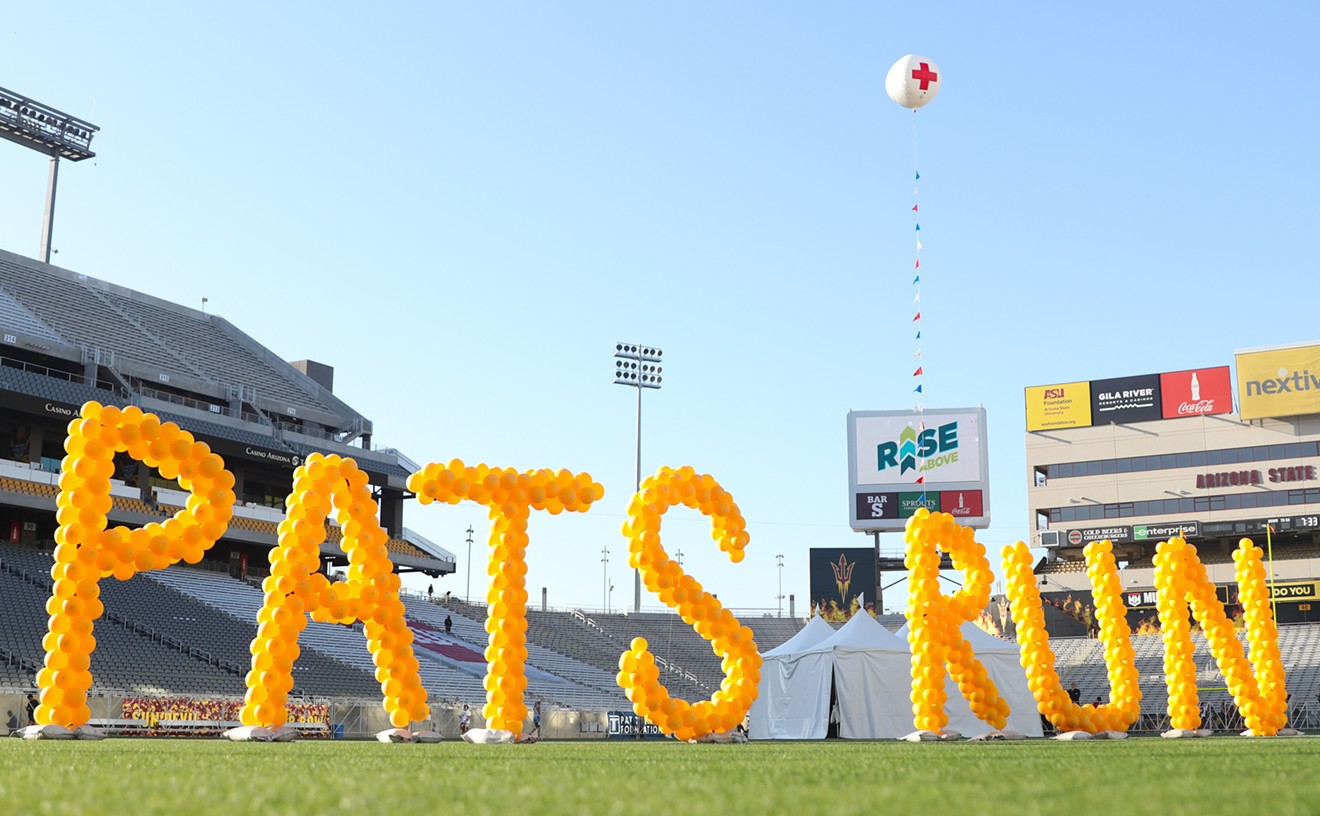This year's Individual World Poetry Slam, sponsored by the Arizona Humanities Council, was thought-provoking to say the least. The event lasted four days at multiple local venues, and led up to a final bout at Marquee Theatre on Saturday, October 11. The iWPS finals offered exposure not only to this year's top contenders, but to the culture of slam poetry.
See also: Ignite Phoenix After Hours Returns November 14; Still Seeking Submissions
Smaller, local competitions take place globally, each qualifying poets for the World Poetry Slam. Seventy-two poets started this week's competition; a fraction of them made it to the finals.
One of the first things I noticed about the finals round was how diverse the audience was. People of all ages, sexual orientations, skin tones, and gender identities filled the audience. Five judges were chosen at random from the crowd to serve as arbiters for the final round. From an outside perspective these judges seemed to favor particular (somewhat predictable) attributes over others. Whether this is reflective of the individual judges' preferences, the audience's influence, or the culture of slam, I just can't say.
Twelve poets made it to the final round. A thirteenth poet, designated the "calibration poet," performed first to provide a point of reference for further scoring by the judges. Brenna Twohy, the Calibration Poet, was the 13th ranked poet in this week's preliminary bouts.
Twohy's calibration poem started off on a comically. Rule number one of slam poetry: if a piece starts off funny, it almost definitely will not end that way. The poem began by discussing the speaker's preference for fantasy porn. Everyone laughed. It's funny when a skinny white girl in a white dress talks about what kind of porn she likes, right? Then the poem got real, as the poet began to question why her penchant for Harry Pott-erotica is any less realistic or than the images portrayed in regular, run of the mill porny-porn.
That's where the poem got serious, but also where it stopped being innovative. The piece then descended into an analogous exploration of women as meat to be butchered by men. If you ask me, the whole {Insert oppressed group} as sacrificial prey to {insert oppressive group} is a pretty tired metaphor. It hasn't gotten any more interesting since Upton Sinclair wrote about it, and it won't get more interesting if you put it in a pretty package and tie it up with a pornographic ribbon.
Which brings us to rule number two of slam poetry: if a poet talks about vaginas (bonus points for using the Pussy word), or if they talk about ejaculating in or on a place that is generally considered risque, the crowd will go wild.
I want to pose this as a question to slam poets, and to participants in the slam world: if you preach about female pleasure and male sexual release in a way that is inherently audience arousing, are you really making an ironclad social statement, or are you also maybe-kind-of-sort-of-probably recapitulating gender stereotypes and reinforcing the psychological means of sexual exploitation?
The twelve finalists made their way onto the stage for the first found of the iWPS finals. The first round featured some classic (read as: generally repetitive) pieces wherein many of the poets built themselves into boxes. The walls of these boxes were crafted from demographic factors, for example: I am a cis- / trans-gendered hetero- / homo- / bi-sexual black / white / asian / latino man or woman and I am angry / unrepentant / afraid. These boxes presented an immediately identifiable schematic representation of each poet to the audience, but were maybe a little more transparent than the poets realized.
Rule Number three of slam poetry: poets must be angry about their particular brand of oppression. Audience members must bear witness to this anger. At no point should anyone present solutions. Whenever possible, Capitalism can and should be blamed. All of the poets at Saturday's bout were angry; few seemed cognizant of the fact that being an artist of any kind is in many ways - dare I say - kind of a luxury. I will also add that tickets to the finals event were priced pretty prohibitively - at $34 a seat, it's hard to view the event as an anti-capitalist enterprise.
Two poets stood out in this round for their defiance of the "box" structure. The first, Hieu Nguyen, reflected on a history of molestation as a child. This created a sense of relatability to the poet's traumatic past as a person, independent of race, sexual orientation, or gender.
Ed Mabrey used his first-round poem as an opportunity to craft an open letter to the father of Michael Sam, the first publicly gay man to be drafted into the NFL (rule number four of slam poetry: when in doubt, craft an open letter.) His poem spoke of acceptance and tolerance on a holistic, global level, not just as a result of one particular identifying or oppressing factor. Also he wove in a few pretty funny lines about the homoeroticism of football.
I think it might be easiest to separate the art of slam poetry into "poem-iness" and "slam-iness." I will use "Poem-iness" to refer to a particular poets literary attributes; for instance, if this poem were to be conveyed through print, how would it be received?
As far as "slam-iness" goes, this corresponds in my mind to the physicality and emotion exuded by the poet. I noticed that there were several recurring hand gestures that nearly every poet used at some point or another. This brings us to rule number five of slam poetry. Slam Poets will use one or more of the following gestures: the "arms out wide to the sides, as though crucified" pose, the "raised revolutionary fist," the "disapproving finger waggle", or the "pretend to tear out your hair because you just can't even." Extra points for rhythmically drawing out key words, gasping for breath, and/or ending every important sentence on a dramatic upward inflection.
The next two rounds featured two poets who should be recognized for their "poem-iness," but who were not ultimately rewarded for their "slam-iness." Damien Flores, schoolteacher from New Mexico, was the last competitor to be granted a spot in the competition as a whole and managed to make it to the finals. Damien had the posturing and requisite vocal inflections down pat, but he also demonstrated a literary prowess that many of the other competitors lacked. One poem in particular stuck out, about a woman named Juana Henrietta who was displaced from her position at a tortilleria when mechanized methods of production took over the factory. Damien's presentation was poignant without being overly introspective, and was a really riveting example of great storytelling.
Desiree Dallagiacomo also should be praised for a poem she dedicated to her aunt, who was found dead in a river after battling with homelessness. This poem propelled Desiree to the third round of the finals, but was markedly different from the pieces which surrounded it. Desiree drew parallels between her aunt's life and her own and did so without resorting to Slam cliches. The poem was honest, sweet, and sad, without being overly produced.
Ultimately, competitor Porsha O took home the first place trophy. Porsha's poetry was greatly influenced by her experiences growing up as a black, non-heteronormative female on the Southside of Chicago. My favorite of her poems addressed her relationship with language: the heritage of her accent, diction, and writing style, as well as the momentum she hoped to gain for herself through the use of her words. Ms. O's other works included a poem which deconstructed the stereotype of the "angry black woman" and a piece that referred to capitalism as "the pimp that founded the United States."
Second place was awarded to Danez Smith of Madison, Wisconsin, third to Desiree Dallagiacomo of New Orleans, Louisiana, and fourth place to Hanif Willis Adburraquib of Columbus, Ohio.










